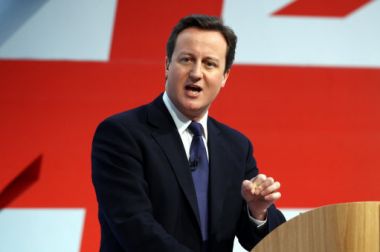David Cameron: Christianity should inspire our politicians

Prime Minister David Cameron stands by his assertion that Britain is a "Christian country", writing today that he believes "very deeply that we should be confident" in that status as a nation.
Cameron's remarks were included in the foreword to the programme for this morning's annual National Parliamentary Breakfast, which he attended along with Ed Miliband – signifying the first time that a Prime Minister and Leader of the Opposition have both made an appearance at the event in its 20 year history.
Hosted in partnership with Christians in Parliament and the Bible Society, the breakfast saw around 700 MPs, peers, church leaders and charity representatives gather in Westminster to eat together, celebrate, attend seminars and listen to Archbishop Justin Welby – who reportedly shared a table with the prime minister – give a keynote speech on the role of the global Church in modern society.
Cameron's attendance at the event was notable, given that he caused waves this April when he declared that despite its multi-culturalism, the UK remains at its heart a "Christian country".
Although many notable figures agreed that historically and culturally Britain does indeed have a strong Christian heritage, others were outraged at the PM's remarks. An open letter – signed by 50 leading academics and scientists including author Philip Pullman and broadcaster Dan Snow – condemned Cameron, arguing that his words served to "foster alienation and division in our society".
Despite these accusations, however, Cameron has insisted that he remains convinced of Britain's status as inherently Christian.
A believer and self-confessed "active member of the Church of England", the prime minister revealed at Easter that he finds his "moments of greatest peace" when he attends the sung Eucharist at St Mary Abbots in Kensington every other Thursday.
He also referred to Jesus as "our saviour", and claimed that Jesus himself "invented" the Big Society - the name given to the coalition government's initiative to empower local communities.
"Jesus invented the Big Society 2,000 years ago. I just want to see more of it," he declared before Church leaders at the Easter reception in Downing Street.
In his foreword today, Cameron went even further in his comments, suggesting that other politicians would do well to back the Christian faith.
"I believe very deeply that we should be confident in Britain about our status as a Christian country, so I think it is absolutely right that our Parliament should express this confidence through this annual prayer breakfast," he wrote, according to The Telegraph.
"Greater confidence in our Christianity can also inspire a stronger belief in our work as politicians to get out there and make a difference to people's lives – and it should inspire our support for churches and faith organisations in the vital work they do in our society and around the world.
"Whatever our political parties and whatever our disagreements these are values we share," he concluded.
In his own address, Archbishop Welby also highlighted the importance of unity, and of harnessing faith to transform society for the better.
"God has no preferences, except a preference of love for the poor, the week and the vulnerable; the widow and the orphan, the alien and the stranger," he declared.
"The Church is the most effective Church when it demonstrates that love...Love and outward-looking should be the characteristic of the Church. Holiness, radical difference in lifestyle. And truth and love drive action and attitude."
Despite Cameron's rousing words, however, the UK's annual Social Attitudes Survey recently found that just 24 per cent of 3,000 individuals polled said that having a Christian faith is an important element of being British, down from 31 per cent who said the same in 2003.
Penny Young of NatCen Social Research, which compiled the study, said this showed British attitudes towards a national identity had become more conservative in recent years.
"In an increasingly diverse, multicultural country, we might expect people to be more relaxed about what it means to be British," she said, according to the BBC. "Yet the trend is going in the opposite direction."











